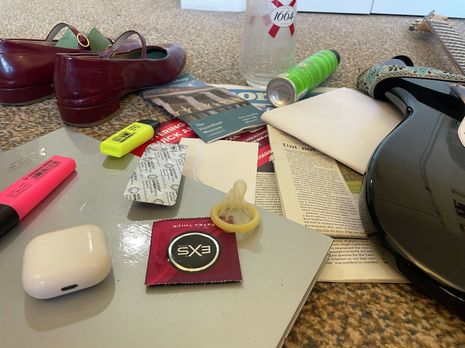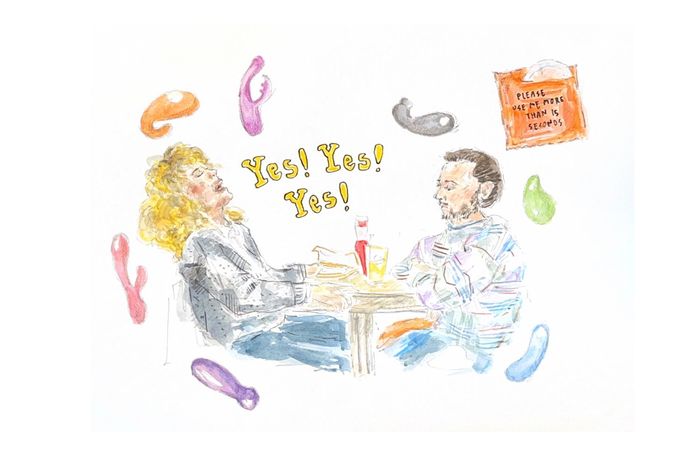Is the condom becoming counterculture?
Is the condom going out of style? Mimi Ronson explores how silence, pressure, and trust are shaping unprotected sex at university

Sex at university is a topic of great conversation: who’s having it, with whom, when, and where. It sparks curiosity, and in the college setting, sex becomes a widely discussed subject.
But the way in which that sex takes place, especially within the UK, has shifted over the last decade. In 2024, Durex’s Global Sex Survey reported decreased condom usage in the UK. It’s no longer just about who’s having sex, but also about how attitudes towards protection are evolving during this stage of intense adolescent growth. With a rise in alternative protection methods and a continuing prevalence of unprotected sex among students, the conversation around student sexuality is entering uncharted territory.
A 2024 WHO survey tracking condom use between 2014 and 2022 revealed a concerning trend across Europe: nearly a third of adolescents admitted to skipping both condoms and contraceptive pills during their last sexual encounter, contributing to a rise in sexually transmitted infections (STIs). This pattern is echoed by Durex’s 2024 Global Sex Survey, which recorded an all-time low in condom purchases, with only 15% of those surveyed using the product. While decreased sexual activity across the UK might partially explain this drop in condom use, there are a variety of other factors at play in students’ decisions to engage in sex without protection.
Using condoms isn’t just a personal or physical decision – it’s also a social and communicative one. It opens up dialogue between two people about trust, risk, and boundaries. For many students, these discussions can be difficult. Ellie, for instance, cites her experiences from being in a long-term relationship as key to her approach to protection. She says, “it’s about trusting the person. I knew them and so I didn’t feel there was risk”. Since then, in her sexual experiences at university, she’s felt similarly little need for protection. Ellie admits that she’s never been in a situation where “the trust has been violated,” and as a result, her sense of health risk has remained low. Paranoia doesn’t factor into her decisions, and being openly communicative about protection is something she is comfortable with. “I’ve never felt influenced by what my sexual partner believed,” she says.
“She recalls a moment at university when a condom was discarded mid-sex, and after hearing her partner express that he preferred sex without it, she “felt guilty”.”
However, not everyone shares her attitude. Lucy highlights the role gender plays in shaping sexual encounters, noting how her desires conform to her partner’s. She recalls a moment at university when a condom was discarded mid-sex, and after hearing her partner express that he preferred sex without it, she “felt guilty”. Lucy ties this to the lingering societal notion that “pleasing men” is still unconsciously ingrained in our sexual psyches. This speaks to the broader cultural expectations around sex – including the idea of “spoiling the flow”.
Ellie has a different relationship with this idea, formed by her own positive sexual experiences. She says, “sex isn’t always glamorous. It’s clumsy and awkward, so stopping to introduce protection to the sexual environment is – for me – okay”. However, the complexities that shape these decisions in the bedroom are not always so healthily experienced. Elena, for example, admits that, despite generally using condoms in her sex life, “when I got really drunk I didn’t”. Alcohol can cloud not only our perception of risk but also our ability to communicate our preferences.
These individual experiences are reflected on an institutional level. Anne Limon Duparcmeur, a college nurse at Gonville & Caius, has observed a shift away from condom use among students but hesitates to simply label it as carelessness. “It’s not that students don’t know about the risks,” she says. “But sometimes they just don’t feel confident enough to bring it up. It can be hard to say what you want – especially when the situation is new or emotionally charged”. Anne identifies communication as being central to students’ decisions about protection. “Condom use isn’t just about having them in your drawer,” she notes. “It’s about feeling able to pause and say something – and that takes emotional confidence. If you’re still working that out, as many students are, it can feel easier to stay quiet”.
“Condom use isn’t just about having them in your drawer […] It’s about feeling able to pause and say something – and that takes emotional confidence.”
She also points out a deeper issue: the social pressure to “go along with things”. “Sometimes we shut down before we get a chance to talk,” she explains. “It’s a kind of flight response – not because you don’t care, but because you’re not quite ready to have that conversation”. Anne acknowledges how society frames the use of protection. “There’s this idea that bringing out a condom ruins the moment,” she says, “but actually, it can be the opposite. It can bring intimacy – it’s a sign that you’re prioritising the care of both yourself and the other person”.
This view is echoed by a representative from Cambridge University for Reproductive Rights, who comments about the emotional weight of silence. “What really spoils the atmosphere,” she jokes, “isn’t using a condom – it’s having to call someone up a few weeks later to say you’ve got chlamydia”. She argues that the discomfort surrounding condom usage often prevents crucial conversations from happening. “We still treat STIs like something shameful, even though they’re common and treatable. That shame makes people avoid talking – or even getting tested”. Both Anne and the Cambridge representative highlight that students who are most likely to use protection aren’t necessarily the ones who know the most about STIs, but those who feel comfortable initiating those difficult but necessary conversations. Anne sums it up simply: “It’s about both people taking responsibility – but one of them has to say something first. And that’s not always easy”.
In this light, condom use is less about logistics and more about emotional safety. As many students continue to navigate their identities and desires, it’s clear that strong support systems, not just free resources, are vital. As Anne puts it: “The decision to use a condom starts way before you get to bed. It starts with feeling like your voice matters – like it’s okay to ask for what you need”.
Names have been changed for privacy reasons.
 News / Judge Business School advisor resigns over Epstein and Andrew links18 February 2026
News / Judge Business School advisor resigns over Epstein and Andrew links18 February 2026 News / Hundreds of Cambridge academics demand vote on fate of vet course20 February 2026
News / Hundreds of Cambridge academics demand vote on fate of vet course20 February 2026 News / Petition demands University reverse decision on vegan menu20 February 2026
News / Petition demands University reverse decision on vegan menu20 February 2026 News / CUCA members attend Reform rally in London20 February 2026
News / CUCA members attend Reform rally in London20 February 2026 News / Gov grants £36m to Cambridge supercomputer17 February 2026
News / Gov grants £36m to Cambridge supercomputer17 February 2026










